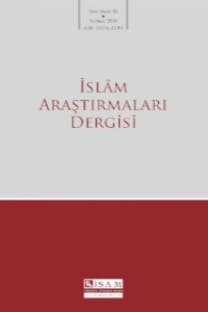Bir Tümdengelim Olarak Şâhitle Gâibe İstidlâl Yöntemi ve Cüveynî’nin Bu Yönteme Yönelttiği Eleştiriler
Mu‘tezile kelâmcılarınca geliştirilen ve kelâm ilminin temel yöntemi hâline getirilen şâhitle gâibe istidlâl veya gâibin şâhide kıyası yöntemi hem kelâmcılar hem de filozoflar tarafından incelenmiş ve bu yöntemin fıkhî kıyastan farklılığı üzerinde durulmuştur. Yöntemle ilgili temel sorun, tikelden tikele geçişin (temsil, analoji) meşru kabul edildiği fıkhî kıyastan hangi bakımlardan farklı olduğu ve kesin bir bilgi verip vermediğidir. Özellikle Fârâbî ve Gazzâlî şâhitle gâibe istidlâli genişçe tahlil ederek yöntemin hangi durumlarda bir temsil olduğunu ve hangi durumlarda temsilden arınarak bir tümdengelime dönüştüğünü irdelemişler ve yöntemin bir kısım uygulamalarını eleştirmişlerdir.
Anahtar Kelimeler:
tümdengelim, yöntem, kıyas, illet, gerçek
The Method of istidlâl bi al-shâhid ‘alâ al-ghâib as a Deduction Method and Juwayni’s Criticism
The Ash‘ari theologists before Juwayni aimed to use the method of istidlâl bi al-shâhid ‘alâ al-ghâib (deductive of the unseen through observation) as a general contextual basis for the deductive method. This practice is different in essence when compared to fiqh, which consists only of the transfer of the verdict from the original event to the consequence, or a transition from a particular event to a particular event; in the method of istidlâl bi al-şâhid ‘alâ al-gâib that which is accepted as being genuine is not a partial situation, but a complete concept derived from the abstraction of the parts. But Juwayni, working from doubts and determinations on the limits of reason, refutes all articles of deduction with istidlâl bi al-şâhid ‘alâ al-gâib. His criticisms are based on the idea that there is no union of reality and cause between God and the universe. Juwayni, who refutes the deductive method of istidlâl bi al-şâhid ‘alâ al-gâib, arrives at the conclusion that we can attain information about the basic categories of God and existence through al-qiyâs al-khulfî and the method of sabr and taqsîm.
___
- Fârâbî, Kitâbü’l-Kıyâs (nşr. Refîk el-Acem), Beyrut: Dârü’l-meşrik, 1986.
- ISSN: 1301-3289
- Yayın Aralığı: Yılda 2 Sayı
- Başlangıç: 1997
- Yayıncı: TDV İslâm Araştırmaları Merkezi
